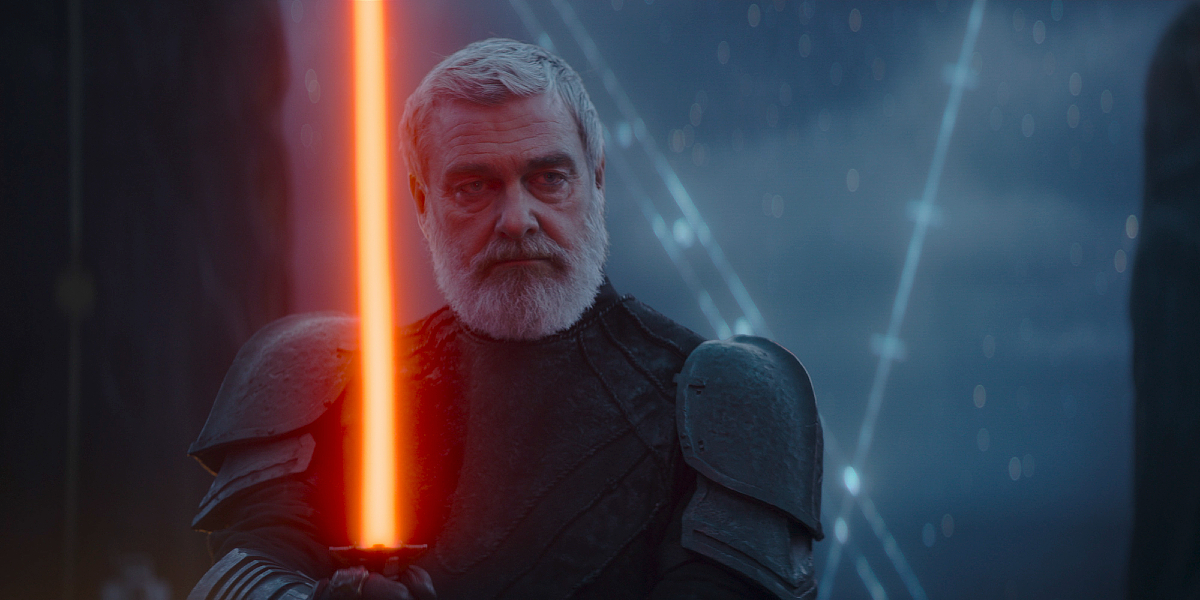‘Ahsoka’ Is Changing How We Think About the Jedi Order

Ahsoka has introduced a new concept that may change how we think about the Jedi Order in the Star Wars universe. Prior to episode 6, “Part Six: Far, Far Away,” a recurring theme in the series has been what it means to be a Jedi. Multiple characters in Ahsoka fall into gray areas; the can’t be easily defined as Jedi and non-Jedi. First, we have Ahsoka Tano (Rosario Dawson), who was trained in the Jedi Temple as a youngling and as Anakin Skywalker (Hayden Christensen)’s padawan. Though she parted from the Jedi Order and doesn’t classify herself as one, she’s a lot more Jedi than most within the Order because she actually lives by the traditional idea of the Jedi, which was to be a guardian of peace.
Spoilers for Ahsoka episode 6, “Part Six: Far, Far Away,” ahead!
Then, there’s Baylan Skoll (Ray Stevenson) and his apprentice Shin Hati (Ivanna Sakhno), who are considered Dark Jedi. Skoll was trained in the Jedi Order, but became disillusioned with it after Order 66. Now he works as a mercenary and appears to fall somewhere between the Jedi and the Sith, as does Hati. We also have Sabine Wren (Natasha Liu Bordizzo), who is training to be a Jedi in Ahsoka. However, she has never displayed Force-sensitivity and seems a bit old to be just now entering a Jedi apprenticeship.
On top of all this discussion of who is and isn’t a Jedi, Ahsoka has dropped an entirely new classification of Jedi on audiences.
The meaning of Bokken Jedi in Ahsoka
In episode 6 of Ahsoka, we catch up with Skoll and Hati for a bit on the planet of Peridea. Unbeknownst to Wren, they are following her, expecting her to lead them to Ezra Bridger (Eman Esfandi). Along the way, Hati inquires if Skoll knew Bridger before, given that they were both part of the Jedi Order. Skoll explains that Bridger was too young to be training at the Jedi Temple at that time. Additionally, when Bridger became old enough to train, there was no Jedi Temple or Order. Order 66 occurred when Bridger realized he was Force-sensitive, meaning he never had an opportunity to be trained in the traditional way that Skoll was. Because of this difference, Skoll views Bridger as a different type of Jedi.
Skoll tells Hati that Bridger comes from “a breed of Bokken Jedi, trained in the wild after the Temple fell.” When Hati suggests that she is also a Bokken Jedi, Skoll assures her that she’s not because he personally trained her to be something more. According to him, all Jedi trained after Order 66 are Bokken Jedi. In the Japanese art of kenjutsu, a Bokken is a wooden sword used for training; Skoll seems to be implying that Bokken Jedi are not legitimate Jedi. While disillusioned with the Jedi Order, he clearly valued its teachings and structure. Thus Skoll sees this new generation of Jedi after the Order’s fall as unfamiliar and a different breed from himself and Ahsoka, who trained traditionally.
By Skoll’s definition, many great Jedi—including Luke Skywalker (Mark Hamill) and Rey (Daisy Ridley)—would also be considered Bokken Jedi. However, just because they weren’t trained traditionally doesn’t mean they’re inferior to other Jedi. Skywalker and Rey are considered among the most powerful Jedi in the Star Wars universe. At the same time, it is very interesting to see this distinction between Jedi being made. Previously, Bridger, Rey, and Skywalker were merely seen as Jedi. Now, there’s this idea that they’re Bokken Jedi, and while they might not be inferior, they are undoubtedly different from the traditional Jedi, largely because they were more free and not stifled by the dogma of the Order.
Skoll’s Bokken Jedi term reminds us that those Jedi who came after the fall of the Order truly did become their own Jedi. It adds yet another layer to Ahsoka‘s discussion of the flaws and strengths of the Order and who these Jedi really are when they exist outside the confines of tradition.
(featured image: Disney+)
Have a tip we should know? tips@themarysue.com